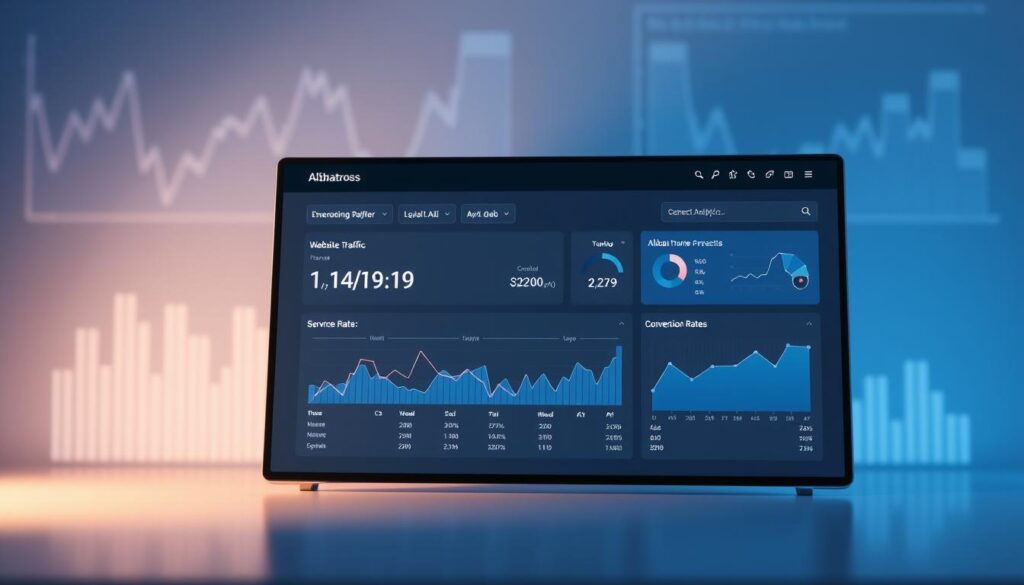In today’s digital landscape, understanding your online presence is crucial for success. Website analytics provides valuable insights into user behavior, helping businesses make informed decisions.
By analyzing website traffic analysis and other digital marketing metrics, companies can refine their strategies, enhance user experience, and drive growth. Effective use of these insights can significantly impact a business’s bottom line.
Key Takeaways
- Understand the importance of website analytics for online success.
- Learn how to analyze website traffic for better insights.
- Discover the role of digital marketing metrics in decision-making.
- Improve user experience through data-driven strategies.
- Enhance business growth by leveraging analytics insights.
Understanding Website Analytics and Its Importance
In today’s digital landscape, understanding website analytics is crucial for businesses aiming to thrive online. Website analytics provides insights into user behavior, helping businesses optimize their online presence.
What Are Website Analytics?
Definition and Core Concepts
Website analytics refers to the collection, measurement, and analysis of data related to website usage. It involves tracking various metrics, such as page views, bounce rates, and session duration, to understand user interactions.
Types of Data You Can Collect
With web analytics tools, businesses can collect data on user demographics, traffic sources, and behavior patterns. This information is vital for SEO data analysis and improving website performance.

Why Analytics Matter for Online Success
Business Benefits of Data-Driven Decisions
Analytics enables businesses to make informed decisions, driving growth and revenue. By analyzing data, companies can identify areas for improvement and optimize their strategies.
Competitive Advantages of Analytics Mastery
Mastering website performance measurement and analytics gives businesses a competitive edge. It allows them to respond to market trends and user needs more effectively.
Essential Website Analytics Tools for Success
In the digital landscape, leveraging the right website analytics tools can make all the difference. With numerous options available, selecting the most appropriate tool is crucial for understanding and enhancing your website’s performance.
Google Analytics: The Industry Standard
Google Analytics stands out as the most widely used web analytics tool. Its comprehensive features provide deep insights into user behavior, traffic sources, and content performance.
Key Features and Setup Basics
Setting up Google Analytics involves adding a tracking code to your website. Its key features include real-time data tracking, audience segmentation, and conversion tracking. Proper setup is essential for accurate data collection.
Reports That Matter Most
Google Analytics offers a variety of reports, but some of the most critical include the Audience Report, Acquisition Report, and Behavior Report. These reports help in understanding user demographics, traffic channels, and content engagement.

Alternative Analytics Platforms
Beyond Google Analytics, there are other analytics platforms that cater to different needs. Some offer more specialized features or more straightforward pricing models.
Paid vs. Free Solutions
While Google Analytics is free, other platforms may offer paid solutions with additional features. The choice between paid and free solutions depends on your specific analytics needs and budget.
Specialized Tools for Specific Needs
Some analytics tools specialize in specific areas, such as e-commerce tracking or social media analytics. Identifying your specific needs is key to selecting the right tool.
Implementing Website Analytics for Actionable Insights
Effective implementation of website analytics is key to gaining actionable insights. To achieve this, you need to set up proper tracking mechanisms that can accurately capture and report on user interactions with your website.
Setting Up Proper Tracking
Proper tracking involves defining goals and conversions that are crucial to your business objectives. This could include form submissions, product purchases, or newsletter sign-ups. By defining these goals, you can measure the effectiveness of your website in achieving them.
Defining Goals and Conversions
Identifying the right goals and conversions is critical. For instance, if you’re an e-commerce site, your primary goal might be sales. You can track this by setting up conversion tracking for your checkout process.
Creating Custom Dashboards
Custom dashboards allow you to focus on the metrics that matter most to your business. By creating dashboards tailored to different stakeholders, you can ensure everyone has the insights they need to make informed decisions.
Analyzing User Behavior
Understanding how users interact with your site is vital. This involves analyzing traffic sources and user journeys to see how visitors navigate your site.
Traffic Sources and User Journeys
By examining traffic sources, you can identify which channels are driving the most valuable traffic. User journey analysis helps you understand the paths users take through your site.
As Avinash Kaushik, a renowned digital marketing expert, once said,
“The goal is to turn data into insights, and insights into actions.”
Optimizing Based on Analytics Data
Analytics data is only valuable if you act on it. This involves using A/B testing strategies to refine your website and improve performance.
A/B Testing Strategies
A/B testing allows you to compare different versions of a webpage or element to see which performs better. This data-driven approach helps in making informed decisions.
Conclusion: Turning Analytics into Business Success
By leveraging website analytics, businesses can unlock valuable insights into their online performance, driving informed decisions that propel success. Effective website performance measurement enables companies to identify areas of improvement, optimize their digital presence, and ultimately boost conversions.
With the right website optimization insights, businesses can refine their online strategies, enhancing user experience and driving engagement. By applying the concepts discussed in this article, companies can turn their analytics data into actionable steps, fostering a culture of data-driven decision-making that fuels online success.
As the digital landscape continues to evolve, staying ahead of the curve requires a deep understanding of website analytics and its role in driving business growth. By embracing analytics as a core component of their online strategy, businesses can navigate the complexities of the digital world with confidence, driving long-term success and staying competitive in an ever-changing market.


